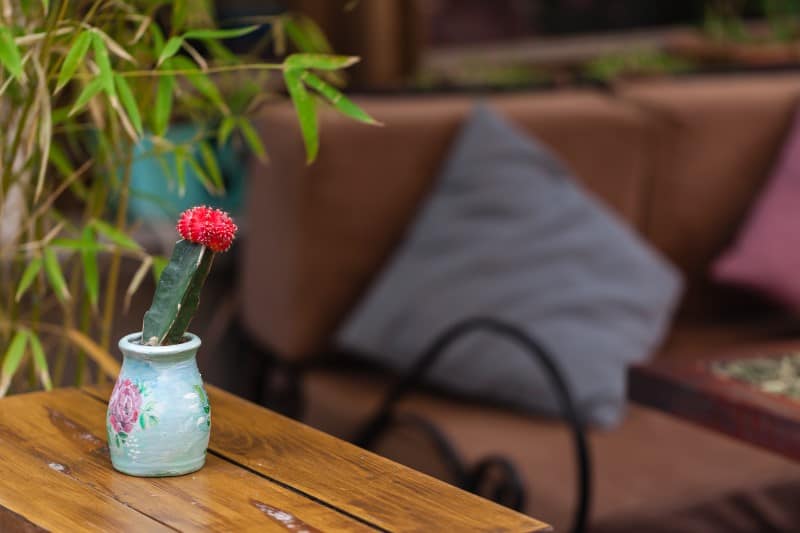Essential oils have many relaxing physical and emotional benefits. They can help reduce inflammation, improve your cognitive functions, and help you de-stress after a long day.
But that doesn’t mean they come without risk. Like any product or chemical, responsible usage is key. Failure to use essential oils properly can result in damaged furniture, particularly wooden surfaces.
Can essential oils damage your furniture? Generally speaking, essential oils will not damage your furniture. But some specific essential oils do have certain effects on your furniture. Incorrect use of essential oil diffusers can also damage your furniture.
Fortunately, there are plenty of ways to avoid accidental spills and keep your furniture looking clean and pristine.

A Few Ways That Oil Diffusers Can Harm Your Furniture
The most common way that essential oils can damage furniture is by spilling or misplacing them. These are some of the most common ways they can get a little messy:
Carpet stains
When adding new oil to your diffuser, it’s possible to spill or drip on the carpet if you’re not careful. If not tended to quickly, some stains can become permanent, or difficult to remove. The darker the oil, the darker the stain may be.
Dripping
Not using a coaster underneath your essential oil bottle could potentially leave a sticky surface behind. This residue could potentially strip the surface when you lift the bottle up. Always clean your bottles after use!
Leaking
Sometimes diffusers can leak – especially if they aren’t good quality. Oil bottles could also leak if not sealed properly. Placing your diffuser on a plate or tray can prevent the oil from getting on your table, counter, or other surface.
Excessive Moisture
A poor quality diffuser that releases too much moisture in the air can not only damage furniture, but also harm any artwork you have hanging on the walls. Keeping your oil diffuser away from walls can help prevent this from happening.
The Most Common Oil Mishaps
Since many people place their oil diffusers on coffee tables, wood stains are one of the most common oil mishaps. In the event that you find an oil stain on your wooden surface, don’t panic – here are a few things you can do to prevent it from setting in and becoming permanent:
Catch It Early
If the spill just happened, that means the oil hasn’t soaked in. You can soak it up with a towel or a newspaper. After that, make sure the excess moisture is absorbed and gently rub the stain with detergent. This cleaning method works best on surfaces finished with polyurethane.
Absorb, Absorb, Absorb
Should you spill essential oils on a wax surface, you can rub the stain using steel wool. Once any remaining liquid is absorbed (use a towel or newspaper for that), follow up with furniture wax or tongue oil to make the stain disappear.
Look in Your Kitchen Cabinets
One effective cleaning agent can be found in the kitchen cabinet where you keep your baking ingredients. Cover the soil stain in baking soda, and let it soak up the oil for up to ten minutes.
Where Not to Keep Your Oil Diffuser
Oil diffusers don’t take up a ton of space, but you’ll want to be careful about where you store it. A vintage table, for example, may not be the best options due to the risk of stains. At the same time, you’ll want to place it somewhere that you can experience the aroma’s full effects. Depending on the type of diffuser you get, you can easily blend it with your existing home décor so it won’t stick out or look unnatural.
Ultimately, you’ll want to keep it in a place where it can’t be easily knocked over, where excess moisture won’t get under places it shouldn’t, such as under wallpaper. To prevent concentrating the oil in one location, which can lead to moldy wallpaper or peeling paint, make sure to place your diffuser in a well-ventilated area.
Not sure where to place your diffuser? Here are a few ideas where not to place it:
Don’t Keep It Too High
To get the most out of your essential oils, it’s best to place the diffuser below eye level. This allows the mist to rise, which is best for adding a pleasant scent evenly spread out in your space. But if the diffuser is placed too high, you not only won’t be able to smell the oil as well – the moisture can damage the paint on the ceiling.
Don’t Keep it Close to Walls
Keeping an oil diffuser too close to a wall can cause wallpaper to peel if moisture gets locked underneath. Even if the oil is diluted with plenty of water, some oils can still leave stains on light-colored surfaces. If the diffuser mist gathers on the wall, then less of the scent will fill the room, giving you less of the benefits you want.
Always Keep Out of Reach of Kids and Pets
It’s best not to keep your diffuser in a place where your kids or pets like to play. While oils used in moderation aren’t harmful, ingesting them can be – so you don’t want your kids or dog to be able to knock the diffuser over. Choose a solid table or shelf that’s too high for little hands or paws to reach.
Ideas Where to Keep Your Diffuser
We’ve discussed where not to keep your diffuser, so now you’re probably wondering: where can I store it? Here are a few suggestions:
Consider Where You Spend Your Time
For many people, the rooms that get the most attention are the kitchen and the living room. Where do you and your family gather most? Or if you invite guests over, where do you tend to congregate? Kitchen counters or coffee tables work well for diffuser placement (especially since kitchen counters are made for dealing with spills!).
Be Centered
Aim to put your diffuser in a central location. While most people don’t have access to electrical outlets in the center of a room, place your diffuser as close to the center as possible for optimum scent distribution.
Use Your Diffuser Safely and Cleanly
Accidents happen; it’s simply part of being human. They can happen to anyone, so don’t feel bad if it happens to you. If you spill your essential oils, don’t wait – you can prevent permanent damage by mopping it up quickly.
The benefits of oil diffusers far outweigh the minimal risk of staining. More than simply making your home smell nice, essential oils can help clear up respiratory and antiviral issues and relieve stress, which is beneficial for people with depression or anxiety disorders. Essential oils can be diffused in the air, or used as part of a massage, topically applied (after being diluted with water), or inhaled. Far from being a recent trend, essential oils have been used for their healing properties for thousands of years. You, too, can benefit from their healing properties.
Using them wisely can prevent damage to walls, furniture, or paintings. Essential oils should not be more than 5% concentrated for safe, effective use.
Make sure to clean your diffuser regularly in between uses. You can do this with soap and water. Failure to clean your diffuser can result in mold growth, which you definitely don’t want to breathe in.
Read more:
